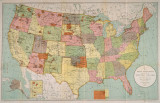| OCR Text |
Show 30 REPORT OF THE COMMISSIONER OF INDIAN AFFAIRS. The power vested in the Secretary of the Interior to end-the trust period by issuing patents in fee simple, thereby making citizens of the allottees, is a very important one, if not the mo~itm portant relating to Indians that has been vested in the Department; and it is logically ' correct and in harmony with the spirit of the body of our law. The only way in which an intelligent and self-dependent Indian could obtain relief from the shackles of wardship before the enactment of the Burke lam was by special legislation, and the evils of encourag-ing that practise in any direction are too obvious to call for rehearsal here. The usual accompaniment of graft and blackmail is enough to condemn a resort to such procedure for any purpose which it is practicable to effect by other means. m i l e on this subject, I trust I may be pardoned if I volunteer a few thoughts as to the policy to be pursued in exercising the power to issue patents in fee. Any Indian who is earning a livelihood at an1 honorable occupation, if he wishes to own his lands in fee, should have the privilege at once, because a man who has worked for his own sup-port for any length of time will generally have some idea of the valup of his land. Under ordiliary conditions I would rather see' an In-dian who is working as a section hand on a railroad get his ,land free from governmental control than one who has no fixt calling, no .matter what may be t@ relative scholastic education of the two. I know full blood Indians who can not speak or write a word of Eng-lish, but are making their way creditably as farmers or freighters or boatmen, who would better deserve their patents in fee than one who takes a job as interpreter at $10 per month rather than cultivate hi? allotment. It is no sign of an Indian's fitness to manage his own affairs that he employs some one to get his patent issued; if he does not how that the agent or superintendent is paid .by the Govern- ' , ment to do such work for him, it is open to question whether he knows enough to conduct his everyday business. . In short, I would make indnstv the primary test ana use this as a lever to force ~ndians toe arn their bread by labor. There i s no danger of proceeding too slowly; the spirit of the times will not per-mit any stagnation. The legislation of recent years shows conclu-sively that the country is demanding an end of the Indian question, and it is right. The Burke law, wisely administered, will accom-plish more in this direction than any other single factor developed in a generation of progress. When it is supplemented by other legisla-tion which will enable their pro rata shares of the tribal moneys to be paid, principal and interest, to competent Indians, the beginning of the end will be at hand. Such Indians, owning their land in fee, and receiving their port,ions of the tribal property without restriction, can not by any course of action maintain a claim for further con-sideration. Thrn such measures the grand total of the nation's wards will be diminished daily and at a growing ratio. |



































































































































































































































































